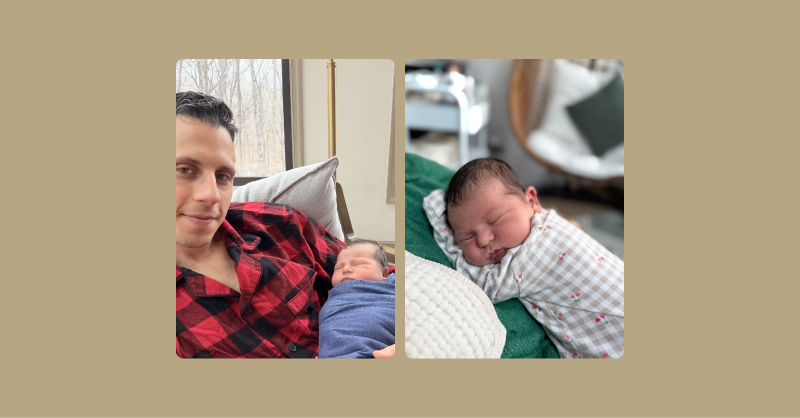BL&T No. 157: Exploring Arthur Brooks's "Macronutrients of Happiness"

This post originally appeared in my weekly newsletter, BL&T (Borrowed, Learned, & Thought). Subscribe
Borrowed & Learned
In late March, I was en route to Shoptalk in Las Vegas. I remember having mixed feelings about the trip. On one hand, I was looking forward to experiencing the event and hosting an invite-only dinner with Barrel tech partners, Recharge and Rebuy. On the other, I didn't like being away from my five-months-pregnant wife, Dana. Luckily, she was doing fine, but I'd been traveling a lot at the time and the prospect of growing our family was beginning to set in. In the end, it was nothing to be concerned about and turned out fine, but in the moment, the feeling was hard to shake.
On my flight to Vegas, I listened to an episode (#226) of Peter Attia's podcast, The Drive, with guest and Harvard Professor Arthur Brooks, who was on to talk about happiness and his book, From Strength to Strength. In the interview, Brooks likened happiness to nutrition. Much like finding the right balance of carbohydrates, protein, and fat for a nutritious diet, he believes enjoyment, satisfaction, and purpose are the macronutrients of happiness. In other words, we are most happy when these elements are balanced and abundant.
I remember feeling inspired by the conversation, yet I struggled to find the right mindset for writing and reflection. It could have been the fatigue from attending events all day, networking, and hosting the dinner, or perhaps the deep-rooted uneasiness of being away from home. Likely, a blend of both. Either way, as I sat down to write this week's newsletter, I stumbled upon an unfinished draft of the post I had started in my hotel room back in March. Now felt like the perfect time to complete it.
To finish the post, I went back and listened to podcast clips. Hearing Brooks unpack happiness got me thinking about what happiness means to me. While there have inevitably been and will continue to be challenging seasons in my life, I am grateful for the feeling of happiness when I zoom out and look at where I've been and where I'm going.
In Does Arthur Brooks Have the Secrets to Happiness?, Brooks suggests that "happiness starts with awareness of our desires, cravings, emotions, and feelings, without automatically reacting to them." We must manage ourselves, and become the CEO of ourselves. From there, we can practice and get better at happiness. Brooks goes on, "You have to work on [happiness] every day, because life pulls you away from it. And so your pursuit of it must be rigorous, almost technocratic—the way a think tank scholar might approach a matter of economic policy."
Looking back, the difference in my sense of happiness now vs. several years ago comes from a continuous commitment to working on my perspective and outlook. It's not that I no longer experience unhappiness, it's how I relate to and manage those moments.
There are a ton of insights to pull from Attia's interview, but today, I'll focus on the macronutrients and how they relate to me.
Enjoyment
Brooks describes enjoyment by contrasting it with pleasure—pleasure is noticing how tasty Thanksgiving dinner is, while enjoyment is the experience of having dinner among family and friends. We can find pleasure in an activity, but enjoyment is an elevated experience.
Making this distinction has been helpful for me in shaping my habits and prioritizing how I spend my time. For instance, I found pleasure in writing for many years but never made writing a priority. When I saw how writing could help me resolve ideas, generate new ones, and connect with others, I enjoyed the experience of writing much more. It became a focus in my life. The more I wrote, the better I became, the more I enjoyed the practice.
I could share a similar story with other interests like working out, reading a book, or even spending time with different friend groups. It's one thing to leave an experience feeling content, another to recognize how it can enrich your life.
Satisfaction
In the podcast, Brooks naturally quotes Mick Jagger's famous line, "I can't get no satisfaction," but points out that this is not actually the issue. We all find satisfaction in different pursuits; the trouble is staying satisfied.
I used to think about satisfaction only as the feeling I get when I accomplish a goal. While that is, in fact, satisfaction, I've learned how fleeting that sort of satisfaction really is, and chasing it can actually be quite depressing, even when successful.
Even someone as accomplished as Peter Attia, who embarked on a self-imposed 11-hour swim across the Catalina Channel, shared a similar sentiment—how quickly he turns to the next pursuit after reaching a goal.
It's a cliché, I know, but finding satisfaction in the journey has been transformative. It motivates me to persist and push harder. While I still value having goals, my focus has shifted from the sole act of accomplishing them to embracing the numerous milestones along the way. For me, this can be everything from tracking my habits to completing a new six-week workout program to receiving feedback on my writing.
In the book, With Winning in Mind, author Lanny Bassham describes a similar concept: "Accomplishment is all about outcome and it is important. We determine who wins by accomplishment. It is the score, the color of medal and your place on the list of competitors at the scoreboard. What it does not measure is what you’ve learned or your growth as a competitor. It does not measure who you have BECOME."
Bassham's emphasis on personal growth resonates with me. As much as I hope to accomplish my goals, satisfaction has become about knowing who I have to become, committing to a lifestyle, and embracing the journey.
Purpose
For people who come to Brooks looking for guidance, he starts with two questions to begin helping them find their purpose: Why were you born? For what are you willing to die? These questions help identify what's important in our lives. However, it doesn't stop there.
Purpose is about having a direction in our lives, knowing that there will be challenges and setbacks. What matter is our experiences and efforts are pointing us in the right direction.
In an article from The Atlantic, Brooks and fellow author Lori Gottlieb highlight how the unhappy moments in our lives can help us find purpose: "If you’re anxious, what is causing the anxiety? If you’re angry, are there some boundaries that maybe you need to set? ... when we talk about meaning and purpose, if you don’t listen to your feelings, they’re going to direct you in the direction of meaning and purpose, they’re going to tell you what is important."
When I first listened to the podcast, I was still getting used to the idea that I was becoming a parent, but over the last several years, began changing how I think about my health and well-being, knowing I'd be a father someday. Months later, my son Mylo is here!
While my purpose centers around my family, I believe purpose and meaning can be multi-faceted. In the podcast, Brooks talks about how the happiest people understand life is bigger than themselves, while the unhappiest focus only on themselves. In that way, I find meaning in my life through other avenues, such as sharing ideas, supporting others in their pursuits, and contributing positively to the world around me.
Thought
When have I felt happiest in my life? Across each macronutrient, what contributed?
+








